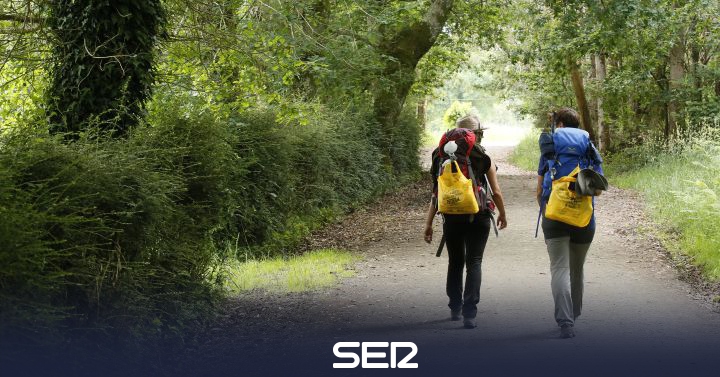The Castilla and leon meeting and Ecoembes, the non-profit environmental organization that coordinates the recycling packaging in Spain, launch a new edition of the campaign ‘Recycling Path’ in the region. This initiative, which was born in Castilla y León in 2015, has presented the most special edition of its trajectory, since for the first time there will be two Jacobean years in a row (2021 – 2022). Coinciding with this milestone, the Camino del Recycling, also wants to make history and be remembered for being the most committed Holy Year to recycling and the environment of all those that have been celebrated.
With an eye on this extraordinary purpose, the environmental project seeks that the thousands of pilgrims that annually travel the Santiago’s road may separate and recycle the different packaging waste that is generated during each stage, thus avoiding garbage (waste generated by humans and abandoned in nature).
To achieve this, Castilla y León participates in this pioneering environmental initiative, together with other communities such as Galicia, La Rioja, Asturias and Navarra, which are joining the initiative for the first time.
In addition, this 2021 the campaign has also been extended to the lodgings of the Primitive Way in Asturias and Galicia, thus adding a total of 359 ecoalbergues in five Roads (French, English, Portuguese, North and Primitive).
“May the road leave its mark on you. Not you on it”
Nieves Rey, Director of Communication at Ecoembes, commented on the important significance of the new slogan: “May the road leave its mark on you. Not you on it.”
“We want to thank the Junta de Castilla y León for their great support to the Camino del Reiclaje project, since we are sure that with their help, as well as that of the pilgrims and hospitaleros, we will ensure that this Jacobean Year 2021 is remembered for being the most sustainable and committed to recycling history “he also wanted to emphasize the importance of the power of collaboration in the fight against trash.” The Camino de Santiago is an experience that always leaves a mark on pilgrims, but it is very important that the only footprint that let them be their footsteps so that future generations can continue to enjoy this marvel of landscapes on the Camino as it passes through Castilla y León “, declared Nieves Rey, Director of Communication at Ecoembes.
Castilla y León already has 77 eco-hostels
In addition to raising awareness of the importance of fighting garbage, another objective of the Recycling Path is to help hospitaleros to turn their lodgings into sustainable shelters. And it is that, since the beginning of this initiative in 2015, eco-shelters have been consolidated as a fundamental element to help raise awareness among pilgrims and a point of reference recycling.
Specifically, in Castilla y León the involvement of 77 eco-shelters has already been achieved, which are part of the almost 400 shelters that participate in the project.
All the eco-shelters are given a kit that consists, among other things, of educational posters, an identification stamp for the shelter as a collaborator of the campaign (Ecoalbergue), Compostelas del Ecoperegrino and reusable bags made with recycled PET to deliver to the pilgrims.
In this way, the 77 Castilian-Leonese lodgings have been equipped with an average of 2 to 4 yellow recycling points -where the plastic containers, cans and briks- and blue ones are deposited.
-designed for paper and cardboard packaging- that include a BIDI code whose objective is to resolve any doubts that EcoPeregrinos may have at the time of depositing waste thanks to AIRE, the pilgrim recycling bot, which is active on the Camino website of Recycling.
Likewise, in order to be able to collect data on how many kilos have been recycled thanks to the count of the times the bins are emptied weekly, a calendar that also includes eco-tips and key days for the environment has been delivered to the Eco-shelters. so they can give that “green” wink to their guests.
Planting of native trees thanks to the Compostelas del Ecoperegrino
On the other hand, this year the Compostela del EcoPeregrino is maintained, which was born with the aim of giving visibility to the pilgrims’ commitment to recycling and their commitment to keeping the road free of garbage and, in addition, it has a prize. And what better reward than to give back to nature what it once lost? For this reason, for each walker who uploads a photo of their Compostela del EcoPeregrino with three stamps (which can be obtained at the Eco-shelters participating in the Camino Recycling during the months of June to October) with the #EcoPeregrino to their RRSS -Instagram or Twitter-, An autochthonous tree will be planted in an area of Galicia and another in Asturias.
This initiative was already very successful and in February 2020 more than 650 native trees were planted in one hectare of Caldas de Reis, Pontevedra.
Tons recycled in 2019 thanks to the Camino del Reiclaje project
Although last year due to the pandemic many shelters remained closed and the tons collected could not be counted, they were registered in the previous edition. Between the months of June and October 2019, and thanks to the collaboration of pilgrims and hospitaleros, almost 65 tons of packaging were recycled in Castilla y León alone. Specifically, 18,434 kg were deposited in the yellow container – destined for plastic containers, cans and cartons – 46,539 kg in the blue container – reserved for paper and cardboard containers. These figures amounted to more than 264 tons of packaging throughout the project. Specifically, the pilgrims deposited 75,172 kg in the yellow container – destined for plastic containers, cans and briks – and 189,318 kg in the blue one – reserved for paper and cardboard containers.
–


